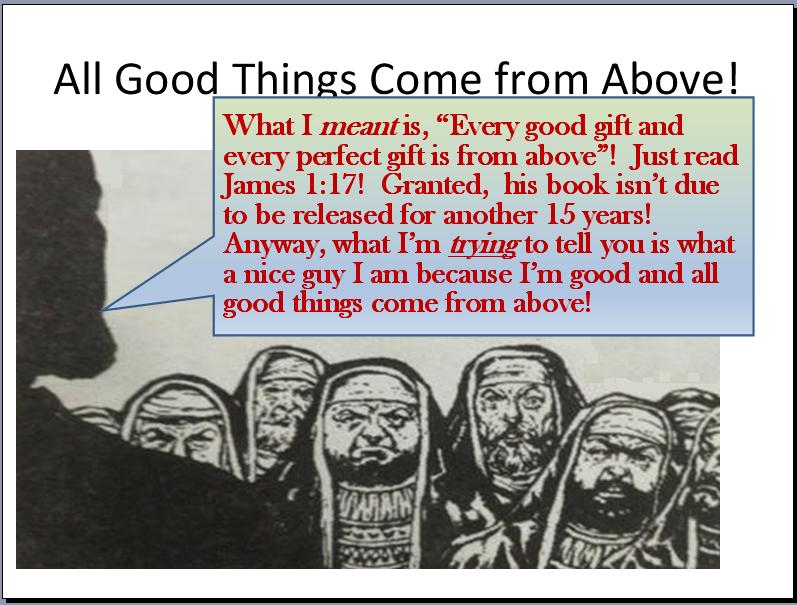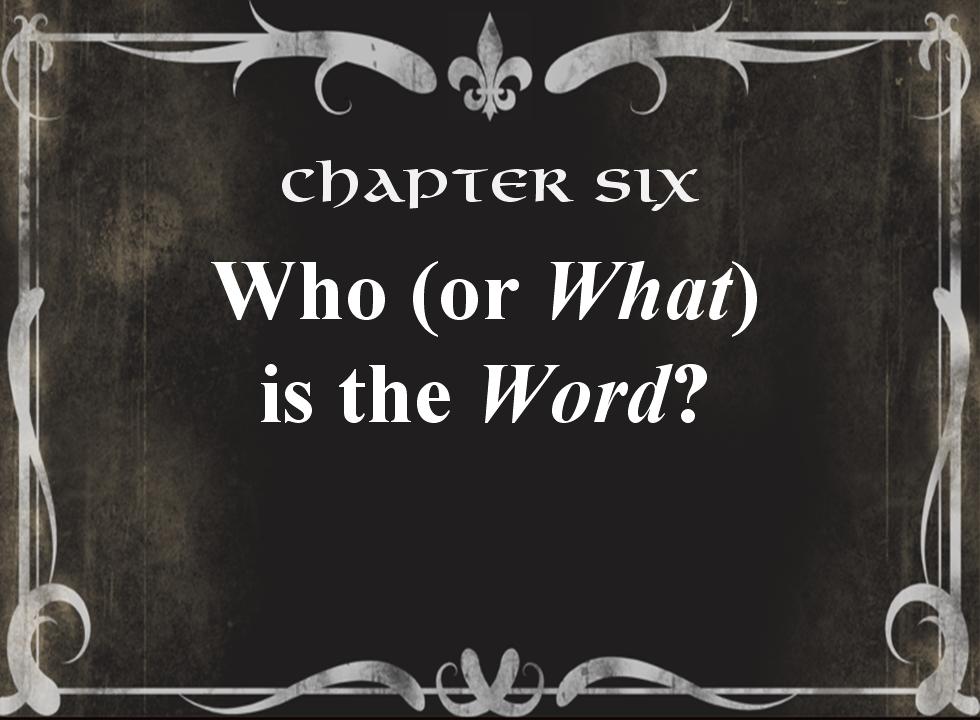
-
DID YESHUA THE MESSIAH
-
Have a Pre-Carnal Existence? - Chapter 5
Part II – The Enhanced Public Debate Presentation
By Larry Acheson
A Response to Chuck Henry’s book
Trinity, Oneness, Duality, and Pre-Existence
|
|
V. Did Yeshua Come Down from Heaven?
|
L |
et's look at John chapter
six. In this chapter, Yeshua told a multitude of Jews that
He is the bread that c ame
down from heaven. The Greek verb translated “came down” is
word #2597 in Strong’s and the specific verb used in John
6:38 is pronounced katabebeka. Look it up. It means
“I descended.” So Yeshua said He’s the bread
that DESCENDED from heaven. That
means He came down from heaven. Not everyone
can say they came down from heaven, and if you read the
entire passage, you know the Jews understood precisely
what Yeshua meant; He meant that He came down from heaven!
ame
down from heaven. The Greek verb translated “came down” is
word #2597 in Strong’s and the specific verb used in John
6:38 is pronounced katabebeka. Look it up. It means
“I descended.” So Yeshua said He’s the bread
that DESCENDED from heaven. That
means He came down from heaven. Not everyone
can say they came down from heaven, and if you read the
entire passage, you know the Jews understood precisely
what Yeshua meant; He meant that He came down from heaven!
But Chuck says, no, that’s not what He meant. What Yeshua meant, according to Chuck, is that all good things come from above and come down from Yahweh. For his proof text, Chuck cites James 1:17:
Here’s what Chuck writes on pages 272 of his book:
The Messiah as the “bread which came down from heaven” is understood in the sense that good things come from above and come down from Yahweh (Jam 1:17).[1]
So when those Jews got so bent out of shape over Yeshua telling them that He’s the bread that came down from heaven, He could have just calmed them down by saying, “Hey, fellas, take it easy! I’m not trying to say I literally came down from heaven! C’mon, can’t you see that what I REALLY mean is that all good things come from above? I’m just trying to make the point that I’m a really good guy, which proves that I came down from heaven because all good things come from above!”
 However, that’s NOT what Yeshua said; let’s read what He
actually said. It’s in John, chapter 6, starting with verse
37:
However, that’s NOT what Yeshua said; let’s read what He
actually said. It’s in John, chapter 6, starting with verse
37:
37 All that the Father giveth Me shall come to Me; and him that cometh to me I will in no wise cast out.
38 For I came down [katabebeka, I descended, #2597] from heaven, not to do mine own will, but the will of Him that sent Me.
39 And this is the Father’s will which hath sent Me, that of all which He hath given Me I should lose nothing, but should raise it up again at the last day.
40 And this is the will of Him that sent Me, that every one which seeth the Son, and believeth on Him, may have ever-lasting life: and I will raise him up at the last day.
41 The Jews then murmured at Him, because He said, I am the bread which came down from heaven.
42 And they said, Is not this Yeshua, the son of Joseph, whose father and mother we know? How is it then that He saith, I came down from heaven?
And Yeshua answered and said unto them, “Hey, take it easy! Don’t you know that all good things come from above? I’m just trying to tell you what a nice guy I am!”
No? That’s not what it says, is it? Instead of
this, the argument and strife drags on and even escalates.
I don’t normally like to skip
ahead
like this, but for the sake of time, let’s skip down to verse 50:
for the sake of time, let’s skip down to verse 50:
50 I am the living bread which came down [katabas, descended #2597] from heaven: that a man eat thereof, and not die.
51 I am the living bread which came down [katabas, descended #2597] from heaven: if any man eat of THIS BREAD, he shall live for ever: and the bread that I will give is My flesh, which I will give for the life of the world.
Again, just to be clear, Chuck is persuaded that when Yeshua said that He came down from heaven, what He actually meant is, all good things come from above. Yeshua, in Chuck’s estimation, did not mean that He literally came down from heaven.
Now don’t get me wrong; there are times when we have to take Yeshua’s words literally and there are times when we must take His words figuratively. When He said that we must eat his flesh and drink His blood in the next few verses of this chapter, we know He was speaking figuratively. We eat unleavened bread at Passover, recognizing its symbolically representing Yeshua’s body. When we drink the wine, we recognize it as symbolically representing His blood. But when He says He came down from heaven, are we supposed to understand that He meant He was a really good guy because all good things come from above? Does that truly fit the context of the narrative? If I understand Chuck’s explanation in his book, that is exactly what he thinks Yeshua meant, and that is what I call a complete distortion of the context.
Just think
of it: If all Yeshua was trying to tell His Jewish
counterparts was that He’s a really good guy, they had no
reason to be angry at Him. Being a
 good
guy’s an endearing quality!
good
guy’s an endearing quality!
In all seriousness, there is no reason to take Yeshua’s words figuratively when He says He came down from heaven. Not only does it fit the context of the chapter, but even the Apostle Paul expressed this same understanding in 1 Corinthians 15:47. For context, we’ll start with verse 45:
45 And so it is written, The first man Adam was made a living soul; the last Adam was made a quickening spirit.
46 Howbeit that was not first which is spiritual, but that which is natural; and afterward that which is spiritual.
47 The first man is of the earth, earthy: the second man is the Sovereign from heaven.
48 As is the earthy, such are they also that are earthy: and as is the heavenly, such are they also that are heavenly.
49 And as we have borne the image of the earthy, we shall also bear the image of the heavenly.
Let’s break down the above in as simple terms as possible. To begin with, let’s keep in mind that the name Adam means “man” or “human being.” This is easily verifiable, not only in a Hebrew-English dictionary, but even a quick Google search reveals this fact:

Instead
of saying, “Adam was the first man,” we could say,
“Adam was the first adam,” i.e., the first flesh and
blood human being. Technically- speaking,
Eve was the second, or if you prefer to limit “adam” to
men, Cain was the second adam. Clearly,
that’s not what Paul is referring to here. Paul is
referring to the first flesh and blood human being,
the one whose name was Adam, who essentially determined the
fate of his descendants when he disobeyed the command to not
eat from the tree of the knowledge of good and evil. The
second Adam is from heaven and as such, is spiritual.
He gave up that spiritual existence when He became a flesh
and blood man (Phil 2:5-8), but unlike the first “adam,” He
chose to obey, not sin. The first Adam walked with
Yahweh in the Garden of Eden, which is a type of heaven. In
fact, the Garden of Eden is often referred to as
“Paradise.” Let’s face it: Adam knew what it was like to
literally have communion with Yahweh – a personal
relationship with Him. In spite of all that, Adam chose to
sin. Yeshua, too, knew what it was like to be with His
Father, but He was willing to give it all up to become like
us, flesh and blood. In spite of taking on human form,
Yeshua refrained from sinning. So yes, Yeshua is the
Sovereign from heaven, who came down to us in human
form. Paul could have written that He’s the Sovereign in
heaven, which would have been a true statement. However, to
say He’s from heaven goes beyond telling us where
Yeshua is; it tells us where He’s from. And
that’s important for us to consider as we weigh Biblical
Unitarians’ testimony.
speaking,
Eve was the second, or if you prefer to limit “adam” to
men, Cain was the second adam. Clearly,
that’s not what Paul is referring to here. Paul is
referring to the first flesh and blood human being,
the one whose name was Adam, who essentially determined the
fate of his descendants when he disobeyed the command to not
eat from the tree of the knowledge of good and evil. The
second Adam is from heaven and as such, is spiritual.
He gave up that spiritual existence when He became a flesh
and blood man (Phil 2:5-8), but unlike the first “adam,” He
chose to obey, not sin. The first Adam walked with
Yahweh in the Garden of Eden, which is a type of heaven. In
fact, the Garden of Eden is often referred to as
“Paradise.” Let’s face it: Adam knew what it was like to
literally have communion with Yahweh – a personal
relationship with Him. In spite of all that, Adam chose to
sin. Yeshua, too, knew what it was like to be with His
Father, but He was willing to give it all up to become like
us, flesh and blood. In spite of taking on human form,
Yeshua refrained from sinning. So yes, Yeshua is the
Sovereign from heaven, who came down to us in human
form. Paul could have written that He’s the Sovereign in
heaven, which would have been a true statement. However, to
say He’s from heaven goes beyond telling us where
Yeshua is; it tells us where He’s from. And
that’s important for us to consider as we weigh Biblical
Unitarians’ testimony.


Here are some unused slides that I created for the warm-up debate I had with Chuck Henry on March 9, 2020, answering the Biblical Unitarian claim that it wouldn't have been fair for Yeshua to have had a pre-carnal existence:
[1] Chuck Henry, Trinity, Oneness, Duality & Pre-Existence, H.V. Chapman & Sons Bookbinders, Abilene, TX, 2018, p. 272.
Up next: Chapter 6 [Previous chapter] [Back to Intro]
Click here to access a full-length PDF file of this study.
First Publication, June 28, 2020
Edited August 16, 2020

A Truth Seekers Publication
Plano, Texas 75074-6010
www.ponderscripture.org

 |
 |
 |
 |
 |
 |
 |
 |
 |
 |
 |
 |
 |

This is the name of our Creator, Yahweh, sometimes called the Tetragrammaton. It is given here in (A) the Phoenician script, (B) the Ivrit Kadum (Paleo-Hebrew) script, and (C) the Modern Hebrew script (a stylization of Aramaic).
Thank You for visiting our website. May Yahweh Bless you as you continue your search for truth.
